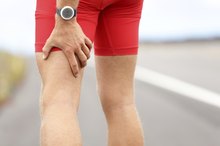Beer Consumption & Muscle Cramps
Observers and participants alike frequently consume beer during and after sporting events. In fact, beer is sometimes more readily available than water, providing thirsty athletes with a much-desired source of fluids. However, athletes and observers should both exercise discretion when consuming alcoholic beverages. Getting drunk impairs judgment and reaction time, also increasing your risk of injury, according to the Centers for Disease Control and Prevention, or CDC. Drinking beer may also contribute to muscle cramps.
Defining Muscle Cramps
A muscle cramp happens when a muscle involuntarily tightens or spasms, causing sudden acute pain. Otherwise known as a charley horse, a muscle cramp often occurs during exercise but can also occur while you're sleeping. According to MayoClinic.com, muscle cramps usually go away on their own without medical treatment. If you experience recurring muscle cramps, check with a doctor to make sure they aren't an indication of a more serious underlying medical condition.
- A muscle cramp happens when a muscle involuntarily tightens or spasms, causing sudden acute pain.
- Otherwise known as a charley horse, a muscle cramp often occurs during exercise but can also occur while you're sleeping.
Reasons Muscles Cramp
Muscle Soreness the Day After Drinking Liquor
Learn More
Muscle damage, possibly due to a heavy training schedule, may increase your risk of muscle cramps during an athletic event, according to a study reported in the March 2011 issue of the "British Journal of Sports Medicine." Increased exercise intensity or previous episodes of muscle cramping also appear to predispose athletes to exercise-induced muscle cramps, says research presented in the June 2011 issue of the same journal. This study concludes that dehydration and electrolyte imbalances don't cause exercise-related muscle cramping.
Alcohol and Muscles
Drinking 1 g of alcohol per kg of body weight after strenuous exercise amplifies the loss of power associated with exercise-induced muscle damage, says a study published in the March 2010 issue of the "European Journal of Applied Physiology." A standard 12-ounce beer contains 13.7 g of alcohol, according to the CDC. For a 150-lb./68-kg man, this means that consuming five or more beers after a workout will cause a significant decline in muscular performance and recovery. However, drinking .5 g of alcohol per kg of body weight after strenuous exercise does not negatively impact muscular performance or recovery, reports a study in the same journal's April 2011 issue.
- Drinking 1 g of alcohol per kg of body weight after strenuous exercise amplifies the loss of power associated with exercise-induced muscle damage, says a study published in the March 2010 issue of the "European Journal of Applied Physiology."
- However, drinking .5 g of alcohol per kg of body weight after strenuous exercise does not negatively impact muscular performance or recovery, reports a study in the same journal's April 2011 issue.
Muscle Cramps and Alcohol
Caffeine in Whey Protein Powders
Learn More
Following a proper athletic training program can lessen the probability of exercise-related muscle cramps, says an article published in the July 2007 issue of the "Journal of the American Academy of Orthopaedic Surgeons." Since drinking 1 g of alcohol per kg of body weight after working out exacerbates exercise-induced muscle damage, and since prior muscle damage appears to predispose athletes to muscle cramps, it follows that limiting your beer consumption after exercising may help reduce your risk of muscle cramps.
Related Articles
References
- Centers for Disease Control and Prevention; Frequently Asked Questions; What Does it Mean to Get Drunk?; July 20, 2010
- "British Journal of Sports Medicine"; Increased Running Speed and Pre-Race Muscle Damage as Risk Factors for Exercise-Associated Muscle Cramps in a 56 km Ultra-Marathon: A Prospective Cohort Study; M.P. Schwellnus, et al.; March 2011
- "British Journal of Sports Medicine"; Increased Running Speed and Previous Cramps Rather than Dehydration or Serum Sodium Changes Predict Exercise-Associated Muscle Cramping: A Prospective Cohort Study in 210 Ironman Triathletes; M.P. Schwellnus, et al.; June 2011
- "European Journal of Applied Physiology"; Post-Exercise Alcohol Ingestion Exacerbates Eccentric-Exercise Induced Losses in Performance; M.J. Barnes, et al.; March 2010
- "European Journal of Applied Physiology"; A Low Dose of Alcohol Does Not Impact Skeletal Muscle Performance After Exercise-Induced Muscle Damage; M.J. Barnes, et al.; April 2011
- Young G. Leg cramps. BMJ Clin Evid. 2015;2015
- Jahic D, Begic E. Exercise-associated muscle cramp-doubts about the cause. Mater Sociomed. 2018;30(1):67-69. doi:10.5455/msm.2018.30.67-69
- Waters TR, Dick RB. Evidence of health risks associated with prolonged standing at work and intervention effectiveness. Rehabil Nurs. 2015;40(3):148-65. doi:10.1002/rnj.166
- Skogar O, Lokk J. Pain management in patients with Parkinson's disease: challenges and solutions. J Multidiscip Healthc. 2016;9:469-479. doi:10.2147/JMDH.S105857
- Hallegraeff J, De greef M, Krijnen W, Van der schans C. Criteria in diagnosing nocturnal leg cramps: a systematic review. BMC Fam Pract. 2017;18(1):29. doi: 10.1186/s12875-017-0600-x
- Mcdermott MM. Lower extremity manifestations of peripheral artery disease: the pathophysiologic and functional implications of leg ischemia. Circ Res. 2015;116(9):1540-50. doi:10.1161/CIRCRESAHA.114.303517
- Blyton F, Chuter V, Walter KE, Burns J. Non-drug Therapies For Lower Limb Muscle Cramps. Cochrane Database Syst Rev 2012; 1:CD008496.
- Grandner MA, Winkelman JW. Nocturnal leg cramps: Prevalence And Associations With Demographics, Sleep Disturbance Symptoms, Medical Conditions, And Cardiometabolic Risk Factors. PLoS One 2017; 12:e0178465.
- Allen RE, Kirby KA. Nocturnal Leg Cramps. Am Fam Physician 2012; 86:350
- American Academy of Sleep Medicine. Sleep Related Leg Cramps. In: International Classification of Sleep Disorders, 3rd ed., American Academy of Sleep Medicine, Darien, IL 2014. p.299-303.
- Maquirriain J, Merello M. The Athlete with Muscular Cramps: Clinical Approach. J Am Acad Orthop Surg 2007; 15:425.
Resources
Writer Bio
A professional writer since 1997, Harvard graduate and pro rock climber Alli Rainey's articles have appeared in "Climbing Magazine," "Rock & Ice" and "Men's Fitness," among many others. Rainey is also an ACTION certified personal trainer (CPT) and climbing coach.









